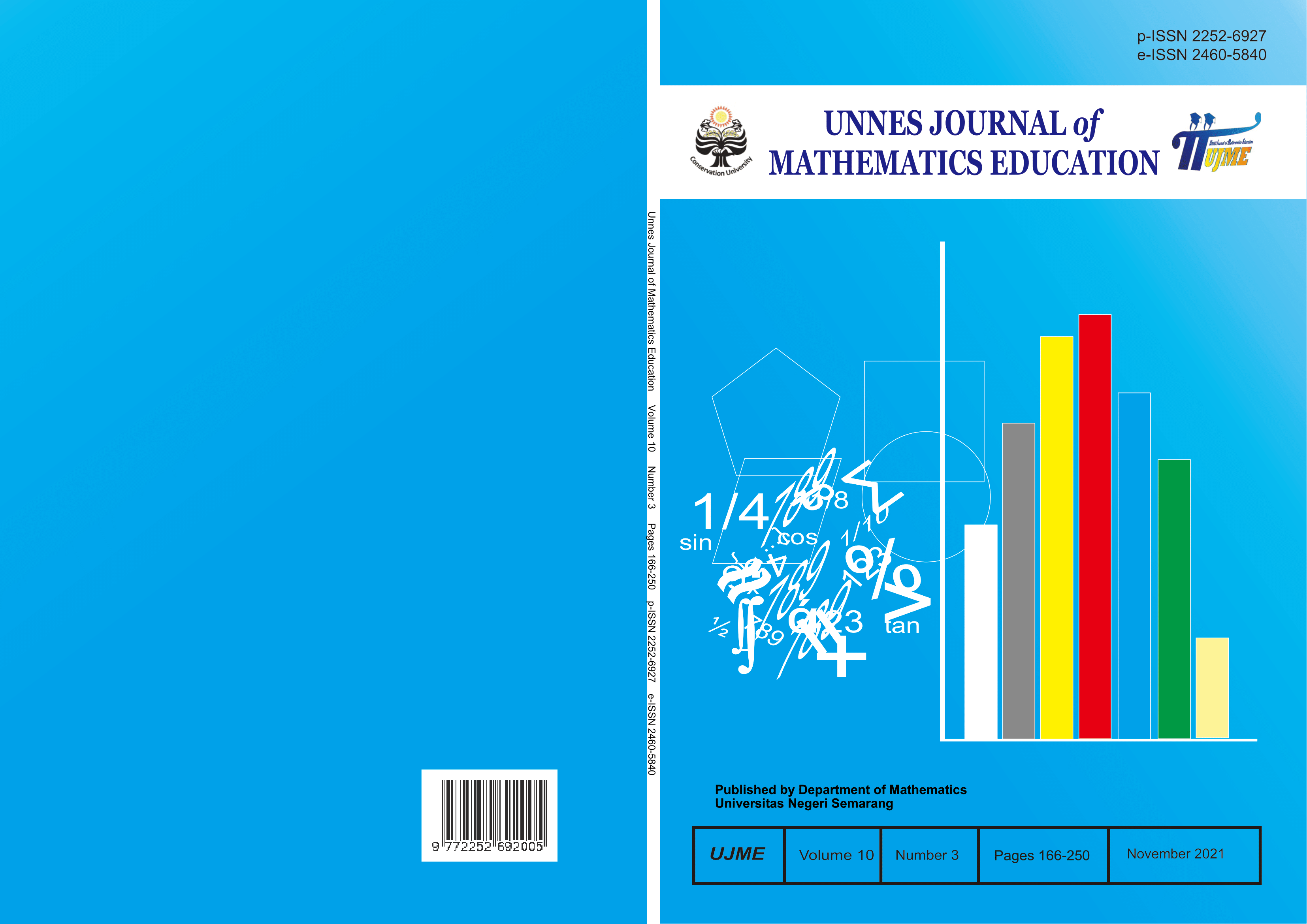Metacognition ability of grade X students in mathematical problem solving through a digital project-based learning with Edmodo
##plugins.themes.academic_pro.article.main##
Abstract
This study aims to determine how the description of problem-solving abilities supported by metacognition skills in digital learning Project Based Learning assisted by Edmodo. This study used a qualitative method. The population taken in this study were students of class X SMA N 1 Jekulo Kudus. This study used a true experimental design with a pretest-posttest control group design. The sampling technique used in this study was a randomized class technique. Data collection was carried out by means of written tests and interviews. Indicators of problem-solving abilities in this study include (1) identifying problems, (2) planning problems, (3) implementing problem solving in accordance with the plan, and (4) interpreting the results obtained. The results of this study indicate (1) the problem solving abilities of students who have high metacognition abilities meet the four problem solving indicators, (2) the problem solving abilities of students who have moderate metacognitive abilities meet the three problem solving indicators, (3) the problem solving abilities of students who have low metacognition ability only fulfills two problem solving indicators.
##plugins.themes.academic_pro.article.details##
References
Achsin, M. 2015.Kemampuan Pemecahan Masalah Pada PBL Pendekatan Kontekstual dalam Tinjauan Inventori Kesadaran Metakognitif. Jurnal Dinamika Ilmu.
Anderson, J. (2009). Mathematics Curriculum Development and the Role of Problem Solving.ACSA Conference.
Anderson, O.W. & Krathwohl, D.R. 2001. A Taxonomy For Learning, Teaching, and Assessing (A Revision of Bloom’s Taxonomy of Educational Objectives). New York: Addision Wesley Longman, Inc.
Fauzi, K. M. A. (2009). Peranan kemampuan metakognitif dalam pemecahan masalah matematika sekolah dasar. Jurnal kultura, 10(1), 1162-1166
Frank, M., Lavy, I., & Elata, D. (2003). Implementing the project-based learning approach in an academic engineering course. International Journal of Technology and Design Education, 13(3), 273-288.
Husain, C. 2014. Pemanfaatan Teknologi Informasi dan Komunikasi dalam Pembelajaran di SMA Muhammadiyah Tarakan. Jurnal Kebijakan Dan Pengembangan Pendidikan.
Holzberger, D., Philipp, A., & Kunter, M. (2013). How teachers’ self-efficacy is related to instructional quality: A longitudinal analysis. Journal of Educational Psychology, 105(3), 774-786.
Iskandar, S. M. (2014). Pendekatan Keterampilan Metakognitif Dalam Pembelajaran Sains Di Kelas. Erudio Journal of Educational Innovation. https://doi.org/10.18551/erudio.2-2.3
Ismayani, A. (2016). Pengaruh penerapan STEM project-based learning terhadap kreativitas matematis siswa SMK. Indonesian Digital Journal of Mathematics and Education, 3(4), 264-272.
Kemendikbud. (2013). Kerangka Dasar dan Struktur Kurikulum 2013. Jakarta: Kemendikbud
Kesumawati, N. (2008). Pemahaman Konsep Matematik dalam Pembelajaran Matematika. Pendidikan Matematika.
Khairunnisa, R., & Setyaningsih, N. 2017. Analisis Metakognisi Siswa Dalam Pemecahan Masalah Aritmatika Sosial Ditinjau Dari Perbedaan Gender. Konferensi Nasional Penelitian Matematika Dan Pembelajarannya II.
Lin, M. H., & Chen, H. G. (2017). A study of the effects of digital learning on learning motivation and learning outcome. Eurasia Journal of Mathematics, Science and Technology Education, 13(7), 3553-3564. http://iserjournals.com/journals/eurasia
Mulyono, Budi. (2013). Pemanfaatan Media Sosial Edmodo pada Pembelajaran Matematika bagi Guru-guru SMA di Kota Palembang. Prosiding. Palembang:FKIP Universitas Sriwijaya
National Council of Teachers of Mathematics. (2000). Prinsiples and Standards for School Mathematics. Reston: NCTM
Nurfitriyanti, M. (2016). Model Pembelajaran Project Based Learning Terhadap Kemampuan Pemecahan Masalah Matematika. Formatif: Jurnal Ilmiah Pendidikan MIPA, 6(2).
Orevi, N. & Dannon, R.: 1999, ‘Learning Ecology with Educational Technologies’, paper presented at the International Workshop on Science Teachers Education toward the New Millenium, Technion – Department of Education in Technology and Science, January 5–6, Haifa, Israel.
Purwaningsih, N. E. & Siswono, T. Y. E. (2014). Profil Metakognisi Siswa DalamMemecahkan Masalah Matematika Ditinjau Berdasarkan Tipe Kepribadian. Mathedunesa Jurnal Ilmiah Pendidikan Matematika, 3(3):152
Romli, M. (2010). Strategi Membangun Metakognisi Siswa SMA dalam Pemecahan masalah matematik. Aksioma, 1(2):1-16.
Safitri, A., Yuliana, N., Alfian, A., Taradipa, E., & Aryani A.S,. 2020. The Effectiveness of Online Learning : The Implementation of Hand Hygiene as a COVID-19 Prevention of the Cognitive and Affective Capabilitiesof Nursing Students. Indonesian Journal of STEM Education, 2(1),19-26.
Scarbrough, H., Swan, J., Laurent, S., Bresnen, M., Edelman, L., & Newell, S. (2004). Project-based learning and the role of learning boundaries. Organization studies, 25(9), 1579-1600.
Sukowati, Dwi et al. (2016). Analisis Kemampuan Literasi sains dan Metakognitif Peserta didik.Physics Communication.Semarang:Univversitas Negeri Semarrang.
Wardono, M. S., & Mariani, S. (2014). The Realistic Learning Model With Character Education And PISA Assessment To Improve Mathematics Literacy. International Journal of education and Research.
Wardono, W., Waluya, B., Kartono, K., Mulyono, M., & Mariani, S. (2018, February). Literasi Matematika Siswa SMP Pada Pembelajaran Problem Based Learning Realistik Edmodo Schoology. In PRISMA, Prosiding Seminar Nasional Matematika (Vol. 1, pp. 477-497).
Wijaya, E. Y., Sudjimat, D. A., Nyoto, A., & Malang, U. N. (2016). Transformasi pendidikan abad 21 sebagai tuntutan pengembangan sumber daya manusia di era global. In Prosiding Seminar Nasional Pendidikan Matematika (Vol. 1, No. 26, pp. 263-278).
Wilson, J. & Clarke, D. (2004). Toward The Modelling of Mathematical Metacognition. Mathematics Education Research Journal, 16(2):25-48.
Wilson, J. W., Fernandez, M. L., & Hadaway, N. (1993). Mathematical problem solving. Research ideas for the classroom: High school mathematics, 57, 78.
Zhu, Z. (2007). Gender differences in mathematical problem solving patterns: A review of literature. International Education Journal, 8(2), 187-203.
Zubaidah, S. (2016). Keterampilan Abad Ke-21: Keterampilan Yang Diajarkan Melalui Pembelajaran. Seminar Nasional Pendidikan. https://doi.org/10.1021/acs.langmuir.6b02842
